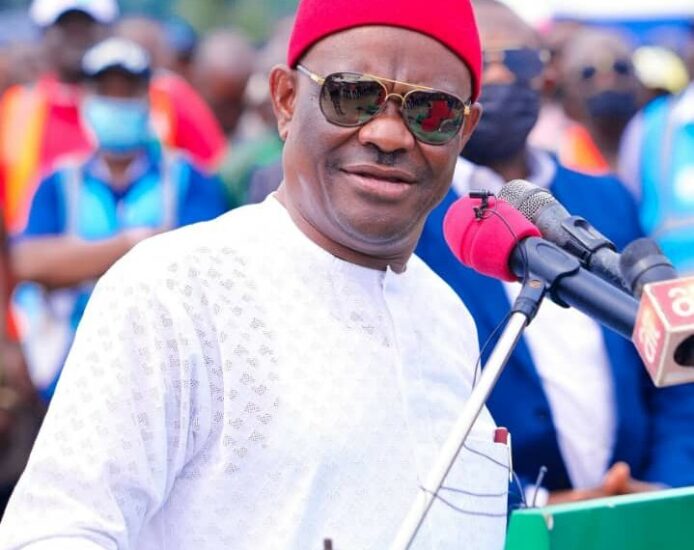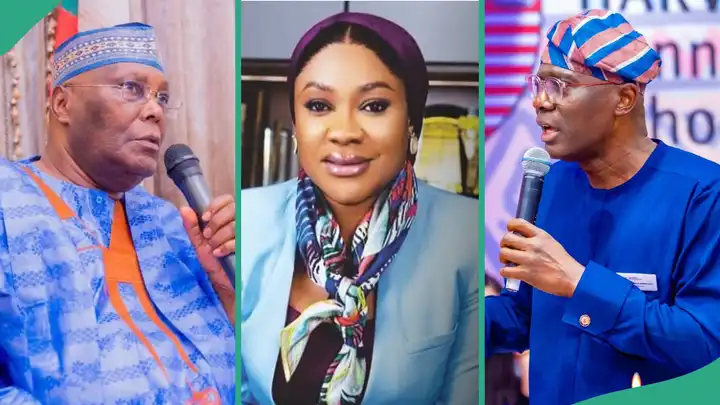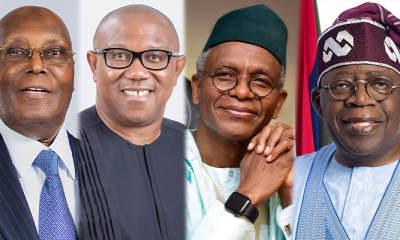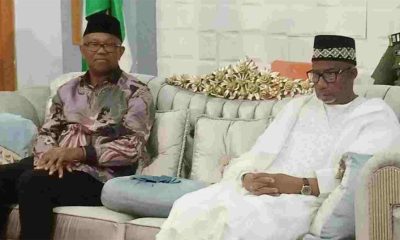News
Controversy over timeframe as Presidential Tribunal commences pre-hearing session

Controversy over timeframe as Presidential Tribunal commences pre-hearing session
The Presidential Election Petition Tribunal (PEPT) will today commence pre-hearing session in the five petitions challenging the declaration of Bola Tinubu of the All Progressives Congress (APC), as the President- elect.
The Chairman of the Independent National Electoral Commission, Mahmood Yakubu, had on March 1 declared Tinubu the president-elect on the grounds that his party scored the majority of votes cast in the polls.
Dissatisfied with the result, five political parties and their presidential candidates filed separate petitions seeking orders to annul the election and declared them as winners or alternatively an order directing the INEC to conduct a fresh election.
The petitioners are the opposition Peoples Democratic Party(PDP) and Atiku Abubakar, marked CA/PEPC/05/2023; the Labour Party (LP) and Peter Obi, marked: CA/PEPC/04/2023; the Action Alliance (AA) and its presidential candidate, Solomon Okangbuan; with No: CA/PEPC/01/2023; Allied Peoples Movement (APM) and its candidate, Chichi Ojei, with suit number: CA/PEPC/03/2023; and the Action Peoples Party (APP) in a petition with No CA/PEPC/02/2023.
READ ALSO:
- Presidential Tribunal: Why Obi will lose in court — Primate Ayodele
- Troops destroy notorious bandits’ leader camps, rescue kidnap victims in Zamfara
- Landlord remanded for beating female tenant
The tribunal has fixed the pre-hearing session after it has stopped receiving replies to the various petitions on April 23.
Technically, today’s proceedings are specifically to sort preliminary applications before proceeding with the substantive petitions.
Regardless of the date fixed for the hearing of the petitions, there are calls by some legal experts, political analysts, Civil Society Organizations, religious leaders and other stakeholders for the amendment of the electoral process in a manner that every election petition case would be dispensed with before swearing in the declared winner.
In Nigeria, election petitions are governed by specific electoral law making them unique in nature. Section 288 of the constitution and the Electoral Act 2022 regulate elections, while petitions are also governed by the 1999 Constitution and the Electoral Act.
The call is necessitated by the fact that some provisions of the 1999 constitution and the Electoral Act erect legal roadblocks and difficult for petitioners challenging the conduct and outcome of elections to sail through to victory at the tribunals.
One of such notorious provisions is section 285 (6) which provides that “An election tribunal shall deliver judgment in writing within 180 days from the date of filing of the petition.”
Those advocating for the amendment of the electoral process are of the view that the Section 285 (6) is inimical to achieving fair hearing enshrined in the same Constitution. To them, setting 21-day time frame within which to file a petition challenging the conduct of elections in Nigeria is ridiculous.
READ ALSO:
- 95-year-old man ‘marries 14 years old girl’ in Abuja community
- Tinubu, Peter Obi celebrates Osimhen for breaking Samuel Eto’o, George Weah records
- Gas explosion kills pastor, wife, housemaid in Delta
They noted that challenging the conduct or outcome of a presidential election implies challenging the election conducted in 36 states and the Federal Capital Territory (FCT). According to the legal experts, law that gives the petitioner 21 days to gather his materials and articulate his grievances in a form that can be presented before the tribunal within 21 days is not progressive, considering the fact that the same 21-day deadline was also given to opposition candidates to file their petitions for other categories of election held in smaller geographical areas like state, district and constituency.
It is therefore their opinion that these requirements of the laws do not provide a fair and level playing grounds for the parties involved in election petitions as swearing in those declared winners pending the determination of the tribunal cases has often given the defendants undue advantage to use the state resources to fight their opponents at the tribunal.
Since the return of the fourth republic, presidential election results have always been rejected and contested at the tribunal with exception to the 2015 presidential election won by President Muhammadu Buhari.
In 1999, the election of former President Olusegun Obasanjo was challenged at the tribunal by Chief Olu Falae. In 2003, Obasanjo’s re-election was challenged by Muhammadu Buhari.
In 2007, both Muhammadu Buhari and Atiku Abubakar challenged the victory of late President Umaru Musa Yar’Adua who won a highly controversial election. Buhari returned to the tribunal in 2011 when he challenged the election of President Goodluck Jonathan.
There was no challenge of Buhari’s victory in 2015 as the then incumbent President, Jonathan conceded defeat and congratulated the winner. However, in 2019, Atiku Abubakar challenged the re-election of President Muhammadu Buhari.
READ ALSO:
- Adamawa man beats wife to death over plans to dump him for another man
- Klopp hails “all-time great” Salah after Liverpool’s win over Brentford
- Diezani Alison-Madueke prays court to vacate bench warrant against her
It is interesting to know that historically, no presidential election tribunal has upturned the election of the declared winner. The closest was in 2007 when the Supreme Court in a split decision of 4- 3 upheld the election of late President Umaru Musa Yar’ Adua.
The point to be considered is that, in all of the above situations, the presidential candidates so declared as winners by the electoral body, all took their oath of office on May 29, while petitions against them were still pending at the tribunals.
Those advocating for the conclusion of election petitions before swearing in the declared winner are of the view that the fact that the constitution prescribed a time frame of about 180 days, doesn’t mean that it must run its course since the policy has been overheated.
However, in as much as it is true that justice delayed is justice denied, it is no less axiomatic that justice rushed is justice crushed.
Until and unless a major constitutional adjustment is carried out, to the effect that nobody must be sworn in as anything whether president or governor or lawmakers until the petition has been exhausted, the laws regulating the hearing and determination of election petitions remains sacrosanct.
Dayo Akinlaja (SAN) said it is not feasible to achieve because there are inbuilt procedures to ensure fair hearing and parties are given timelines for filing processes.
He explained that a party cannot be stampeded to file processes before the expiry of the timelines allowed under the law and each party may decide to hurry or speed up the process.
All parties are entitled to fair hearing and there is no way fair hearing would not be sacrificed where the procedure of adjudication is inordinately rushed.
READ ALSO:
- BREAKING: Tyre bursts into flames as plane crash lands at Abuja airport
- Lagos-Ibadan accident: FRSC advises motorists to use alternative routes
- Why we can’t send wide-body aircraft to Port Sudan – FG
To that extent, the agitation for the completion of election cases before May 29, 2023, cannot be effectuated within the prism or framework of the constitution and the Electoral Act, 2022, which provides for a decision or judgment to be delivered within 180 days of the filing of the petition against the return of a candidate in an election.
There are also the appeals arising therefrom to be completed within 60 days from the date of filing. To be achievable, both the Constitution and the Electoral Act will have to be amended to make such a provision.
In addition to the above, although the timeframe had been spelt out, parties still find ways to raise technical issues like failure to serve parties directly, failure to file within a certain time, failure to tender certain vital documents, objections and arguments over the admissibility of documents, lengthy cross-examination of witnesses etc.
Unfortunately, these are allowed by the (tribunal) courts which have stalled the process thus defeating the purpose of the legislative solutions or gains made.
Furthermore, all decisions must be within the law with judicial activism to restore confidence in the Nigerian election systems and to ensure no party is robbed as justice must not only be done but must be seen to be done.
In the future, it is possible to amend our laws and rules of court to accommodate such an idea, but it is clearly impossible under the nation’s present circumstances.
It is more arduous to prove an election petition than to defend it. That is why the petitioners need more time to prove their cases and not necessarily the defendants.
That is why the Petitioners are given 21 days to file and the defendants have 14 days to respond. And the Petitioners have a further 7 days to reply, making a total of 30 days as against the 14 days of the Respondents. It follows that in leading evidence in court/Tribunal in support of the petitions, the petitioners would also take more time.
Quote: “the agitation for the completion of election cases before May 29, 2023, cannot be effectuated within the prism or framework of the constitution and the Electoral Act, 2022, which provides for a decision or judgment to be delivered within 180 days of the filing of the petition against the return of a candidate in an election”
Controversy over timeframe as Presidential Tribunal commences pre-hearing session
SUN
News
I didn’t collapse, says Wike, warns death rumour mongers

I didn’t collapse, says Wike, warns death rumour mongers
Minister of the Federal Capital Territory, Nyesom Wike, has debunked reports that he collapsed and was rushed to the hospital last week.
Wike described the reports of his rumoured collapse as the handiwork of “baseless” people trying to score cheap political points.
He spoke after inspecting four ongoing projects in the FCT, including the International Conference Centre.
Online posts circulating on X had surfaced alleging that the minister collapsed at an event on Friday in the FCT.
The rumour also claimed that Wike was immediately rushed to an undisclosed hospital, where he received treatment.
Reacting, Wike said, “There was no time I collapsed, there was no time anybody took me overseas. But you see me every day. The day Mr President broke iftar on his birthday, I was there.
“The next day, I led Abuja residents to pay Sallah homage. I see all those stories just died down. This is politics. We have thick skin. Those things don’t bother us. We are not distracted. We are focused on our jobs.
“So, I thank Nigerians for being worried, which should be, but people should not wish their fellow human beings such a thing to happen.
“We know that we will die one day. Nobody will remain in this world forever, but it is only God that says the day you will die, not any human being to say you will die today or you will die tomorrow.
“So, you have seen that I am even healthier than most of them who carried that rumour and I will write their condolence letters. I can assure you that I will write their condolence letters.”
News
World Bank approves Tinubu’s $632m loan request

World Bank approves Tinubu’s $632m loan request
The World Bank is poised to approve $632 million in new loans to Nigeria today (Monday), amid growing concerns over the country’s expanding debt profile.
The loans are intended to support important sectors such as nutrition enhancement and quality basic education.
According to data obtained from the World Bank’s website on Sunday, the two loans scheduled to be approved today are $80 million for the Accelerating Nutrition Results in Nigeria 2.0 initiative and $552 million for the HOPE for Quality Basic Education for All programme.
Both projects are now in the negotiating phase and are likely to gain final clearance later today.
These new loans are part of the World Bank’s overall strategy to support Nigeria’s development agenda, which focuses on healthcare, education, and community resilience.
The loans will support the government’s efforts to improve nutrition and education for Nigerian children.
Additionally, the World Bank approved a $500 million loan for Nigeria’s Community Action for Resilience and Economic Stimulus Programme on March 28, 2025, a significant step towards addressing the country’s economic challenges through expanded access.
The initiative, formally known as the NIGERIA: Community Action (for) Resilience and Economic Stimulus Programme, is intended to give critical support to households impacted by economic downturns while also strengthening community resilience.
The initiative focuses on vulnerable populations, providing assistance to households and small companies to help them cope with economic difficulties.
READ ALSO:
- Okada rider allegedly stabbed to death by wife over money
- Police rescue two persons abducted in Lagos
- Miyetti Allah accuses Benue community of poisoning 20 cows
The loan clearance is likely to considerably boost Nigeria’s efforts to revive the economy through grassroots backing, especially given current issues such as inflation and high living costs.
The stimulus plan will prioritise enhancing food security and developing economic possibilities for the populations most affected by recent economic changes.
This decision came after a delay in distributing funds for a previous loan aimed at poor and vulnerable Nigerians.
Further investigation by The PUNCH revealed that the World Bank disbursed around $315 million to Nigeria from the $800 million allocated for the National Social Safety-net Program Scale Up.
Nigeria is yet to receive further funding from the World Bank for this loan project, which was approved in December 2021. The delay in grant release is most likely due to fraud detected under the initiative.
In honour of the 2023 International Day for the Eradication of Poverty, President Bola Tinubu unveiled a social safety net programme that will distribute N25,000 to 15 million households over the course of three months.
The Federal Ministry of Humanitarian Affairs and Poverty Alleviation was responsible for managing the $800 million World Bank loan initiative.
However, due to allegations of embezzlement, the federal government was forced to stop the cash transfer program for further investigation and reform.
Betta Edu, a former humanitarian minister, was previously suspended for misappropriating N585 million set aside for palliative care distribution.
READ ALSO:
- Wike’s aide slams Atiku, says it’s too late to buy integrity
- Reps Committee recovers N21.4bn from four oil companies
- West African juntas impose levy on imported goods ECOWAS nations
Furthermore, Sadiya Umar-Farouq, Edu’s predecessor, was under investigation by the EFCC. The former minister is being investigated for allegedly laundering N37.1 billion during her stint as minister.
The World Bank also imposed sanctions on people and businesses discovered to be engaging in fraud under the initiatives.
According to the World Bank’s official website, this will bring Nigeria’s total approved loans to $9.25 billion over three years, indicating a growing reliance on multilateral funding to support critical sectors of the economy such as infrastructure, healthcare, education, and financial resilience.
A review of Nigeria’s World Bank loan approvals since 2023, under President Bola Tinubu’s government, reveals a huge rise in funding commitments.
In 2023, the World Bank approved $2.7 billion in loans for renewable energy, women’s empowerment, education, and the power sector. In 2024, funding approvals totalled $4.32 billion for various projects.
This increase was largely due to Nigeria’s growing need for financial assistance to stabilise the economy amid fiscal pressures and rising public debt.
Under President Bola Tinubu’s administration, the World Bank granted around 11 different credit projects for Nigeria.
In less than two years, the federal government has acquired loans from the World Bank totalling $7.45 billion, raising concerns about the mounting debt burden. According to data from the Debt Management Office, the World Bank’s portion of Nigeria’s external debt is $17.32 billion as of the third quarter of 2024.
The International Development Association is owing the majority of this debt, which amounts to $16.84 billion, or 39.14 per cent of Nigeria’s total external debt.
The International Bank for Reconstruction and Development, another World Bank subsidiary, is owing $485.08 million, or 1.13 per cent.
While the planned World Bank loans may give much-needed budgetary relief, concerns persist about the country’s mounting debt burden.
According to recent data from the Central Bank of Nigeria, the country has spent $5.47 billion servicing external debt in the last 14 months, underscoring the strain on its foreign reserves.
World Bank approves Tinubu’s $632m loan request
News
Investigation of wanted businesswoman Achimugu not linked with Atiku, Sanwo-Olu – EFCC

Investigation of wanted businesswoman Achimugu not linked with Atiku, Sanwo-Olu – EFCC
The Economic and Financial Crimes Commission has reacted to media reports linking its investigations of Ms. Aisha Achimugu with political undercurrents involving former Vice President Atiku Abubakar and Lagos State Governor, Babajide Sanwo-Olu
This is contained in a statement by the commission on Friday night.
The statement read, “We wish to state unequivocally that the investigations of Achimugu have no correlation of any kind with the two political actors. She is being investigated for alleged criminal conspiracy and money laundering and has since been declared Wanted by the Commission”.
The EFCC started investigating Achimugu in 2022. Although she approached the court to obtain an injunction restraining the Commission from arresting, investigating, inviting or detaining her for any alleged criminal act, the injunction was challenged and vacated on Wednesday, February 19, 2025 by a Federal High Court sitting in Abuja.
The court ruled that “…no court has the power to stop the investigative powers of the Police or EFCC or any agency established under our laws to investigate crimes when there is reasonable suspicion of commission of a crime or ample evidence of commission of an offence by a suspect.”
“The court further upheld the interim order of forfeiture of assets of Achimugu suspected to be proceeds of crime, dismissing her suit against it as lacking merit .
“The foregoing clearly establishes that the EFCC’s case against her has no immediate or remote nexus with any politician or any veiled or open reference to any political engagement or transaction.
“The EFCC is non-partisan and non-sectarian. We enjoin the public to continue to keep faith with the professionalism of the Commission without imputing any extraneous consideration to its works.”
-

 metro2 days ago
metro2 days agoMan jailed 3 months for non-declaration of $30,000 at airport
-

 International2 days ago
International2 days agoTrump slams Nigeria with high tariff in shocking trade crackdown
-

 metro2 days ago
metro2 days agoUpdated: Notorious bandit leader Bello Turji goes berserk, kills 12 for Eid
-

 metro1 day ago
metro1 day agoPetitioners mobilise constituents for fresh Natasha’s recall
-

 metro3 days ago
metro3 days agoEdo Gov Okpebholo wins round one as tribunal upholds his election
-

 metro1 day ago
metro1 day agoFraud rocks FIRS, court orders final forfeiture of Abuja, Kano houses linked to official
-

 metro2 days ago
metro2 days agoSouth African court acquits Nigerian pastor of rape after 8 years in jail
-

 Business2 days ago
Business2 days agoMore heads to roll in NNPCL, subsidiaries as Ojulari assumes office













